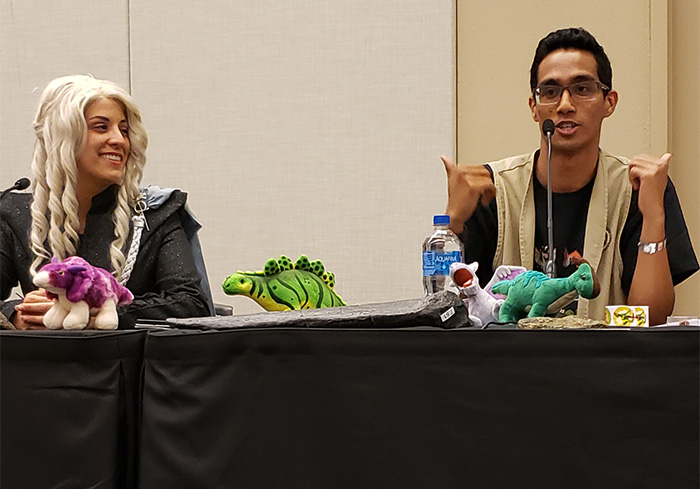
Story by Lana Sweeten-Shults
GCU News Bureau
You can find Grand Canyon University’s professors on most days scribbling on their whiteboards or lecturing in their suits and sensible heels. But not at Phoenix Fan Fusion, where GCU faculty are embracing the nerd within.
About a half dozen professors from the College of Science, Engineering and Technology are filling guest panelist spots at the city’s ultimate science fiction/comic book convention, which runs through Sunday at the Phoenix Convention Center. They're contributing to the event's science and education track programming, produced by nonprofit group RealtimeSTEAM in partnership with Fan Fusion. Included are more than 100 hours of panels, expos and interactive spaces highlighting the scientists, engineers and research institutions in Arizona that put the science in science fiction.
"Pop culture events such as Phoenix Fan Fusion are an amazing opportunity to bring together experts and the general public over a shared love of fandom," said Brian Johnson, co-founder and chief operating officer of RealTimeSTEAM. "We at RealTimeSTEAM are extremely grateful to the convention, our expert volunteers, and the audience for coming together to learn about STEAM (science, technology, engineering, art and math)."
Tens of thousands are expected to attend the geek celebration over its four-day run. It’s where fans might hobnob with celebrities such as Jeff Goldblum (“Jurassic Park”), Elijah Wood (“Lord of the Rings”), Billy Dee Williams (“Star Wars”) or Matthew Lewis (“Harry Potter”). It's also where they can visit with their favorite comic book artists and authors, load up on pop culture merchandise from the hundreds of vendors, do a little cosplay or hang out with a few cool scientists, such as the ones from GCU, who expounded on everything from dinosaurs and anacondas to gross biology, the power of suggestion and ethical considerations when it comes to integrating technology with the human brain.
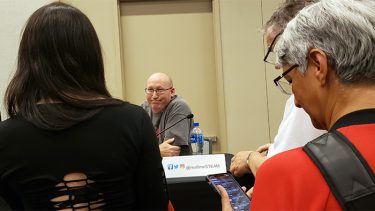
Just because we can, should we?
GCU technology instructor Khester Kendrick contributed his cybersecurity savvy on Thursday to “Ghost in the Shell: Brain Interfaces in Real Life." Panelists explored the themes of the film “Ghost in the Shell,” which depicts a world where scientists have integrated technology with the brain to allow a permanent connection to the internet. They pondered: How close are humans to accomplishing this? And, if we do accomplish it, should we?
“Navigating between 'can we' and 'should we,' I don’t think the 'should' even is going to be considered,” said one audience member. “It’s a matter of we WILL – it’s going to be inevitable.”
Arizona State University professor and panelist Dr. Andrew Maynard asked, what if humans created technology that, on one hand, could cure Parkinson’s disease but, on the other hand, also could be implanted into soldiers’ brains to shut off their emotions so they could become the perfect fighting machine?
“How do you decide what is right and what is wrong there?” Maynard asked.
Added Kendrick, “I think it’s important to note, throughout history, anytime mankind has invented something to help mankind, we’ve also invented something to hurt mankind. So there’s an ethical dilemma there that people and scientists have to perform. Everyone likes to pretend that scientists would never do anything against mankind. But we only have to look at World War II to know that’s a fallacy.”
This year’s Fan Fusion – formerly called Phoenix Comicon – was the first Kendrick has participated in as a panelist, though he has attended previously as a fan.
“I’m a nerd at heart,” he said.
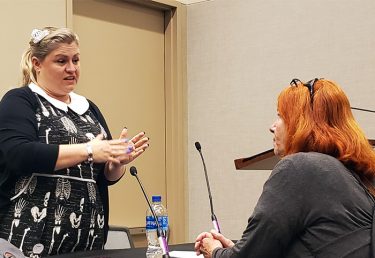
What he loved about being a panelist for RealtimeSTEAM and Fan Fusion is that it's a different take on what he does as a professor.
“It’s semi-realistic and it’s semi-fiction, so you get to explore new avenues, where in the classroom it’s more about reality. ... It’s very much based on facts. Fan fiction, half the questions are not based on fact in any stretch of the imagination, so it’s good to explore that theoretical sense. … I think oftentimes, as a professor or as a teacher, you get stuck in that little bubble, and you don’t really get to see what everybody else is doing. So that’s what I enjoy.”
Fear and the power of suggestion
GCU biology, genetics and human anatomy and physiology professor Dr. Darien Hall embraced her inner fan girl in the “See No Evil: Bird Box & Science” talk on Thursday. She and her fellow panelists explored hit film “Bird Box,” in which humans are compelled to kill themselves after looking upon a mysterious entity that makes them see visions of their worst fear.
The panelists delved into suspicion, fear and the power of suggestion.
Hall weaved her talk around the anatomy and structure of the brain, how humans perceive, and how our senses and body respond to fear.
One audience member wondered about how humans could prevent their fear response: Could the mysterious entity somehow be beheaded so humans can be prevented from seeing its face?
Hall did say certain drugs can block human receptors and dived deep into the idea of how persuasive the power of suggestion can be. She said humans feel empathy and if they see someone being afraid, “You actually have neurons that will activate and light up … allowing you to feel the same feeling.”
Another audience member asked how any creature could compel humans to overcome their need for self-preservation, “because that’s kind of hard-wired in.”
Hall thought about it then smiled, “I got nothin’.”
Gross biology
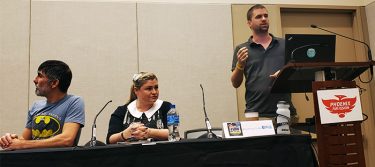
GCU's Michael Barton, who teaches anatomy and physiology, spoke about sweat in the “Sci-lent But Deadly" panel with Hall. The session embraced not only sweat but other gross biology.
Barton focused on the body's apocrine sweat glands, which are concentrated primarily on the armpits. The secretions in the armpits, he said, include more nutrients in them than other kinds of sweat, such as fatty and amino acids. Those nutrients provide a kind of Thanksgiving feast in our armpits for bacteria. It’s when the bacteria start emitting their own waste gas from those nutrients that we start to emit that familiar body odor. What we smell as body odor, he said, is essentially bacteria flatulence.
Are dinosaurs just reptiles?
Rachel Pikstein, who teaches in GCU’s Biology Department, tackled “Dinosaur Conservation Management: The Science of Jurassic World Fallen Kingdom,” a session about movie dinosaurs versus current discoveries in paleontology.
“Dinosaurs, are they just reptiles? No,” Pikstein said, then asked the audience what the closest living relative to the dinosaur is today.
“You’re going to be really disappointed when I tell you. … It's the chicken! You can have some barnyard chickens in your backyard and brag to all your friends that you have dinosaurs.”
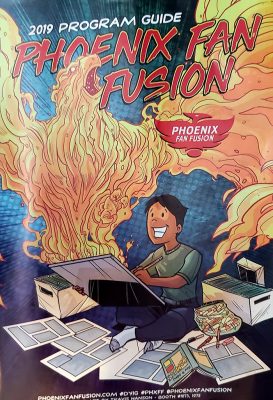
Pikstein, who was dressed as "Game of Thrones'" Daenerys Targaryen, spoke about her love of paleobiology, which combines paleontology with biology. Paleobiologists look at today's living creatures to understand creatures of the past.
She also told the audience about one of the cool things about anacondas. In one study, scientists observed anacondas that hadn't eaten or moved much for 15 months in their confined research space. But, somehow, they showed no measurable atrophy of the muscle and no measurable weight loss.
"These animals are actually being studied to understand how to treat muscle atrophy in people, for example, who are stuck in a wheelchair," she said.
She said reptiles are intelligent creatures but dinosaurs, unfortunately, were not. Dinosaurs have tiny brains compared to their body size, whereas today's big lizards, such as the Komodo dragon, tout not only big brains in relation to their size, but they also have wrinkled brains. A wrinkled brain means more surface area and more synapses for connections in the brain, as opposed to creatures, such as koalas, with smooth brains.

Pikstein then took time out to share her love of reptiles: “This is my big stance. … If you really love dinosaurs and you have an appreciation for them, we really need your help. We have a lot of beautiful reptiles in the world that are really struggling. … People underestimate their intelligence.”
She spoke about reptiles brought into the Phoenix Herpetological Society Sanctuary, where Pikstein volunteers, that have crooked spines because of a lack of the right vitamins or because they were kept in small tanks. “They do feel pain,” she said, adding how even reptiles do have a purpose in the world. They maintain population balances, their burrowing activities improve soil quality, and they help rid farms of rodents.
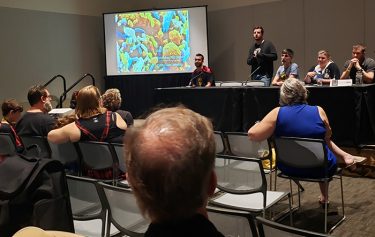
After her "Bird Box" talk on Thursday, Hall said what she loves so much about events like Fan Fusion is getting the opportunity to share her love of science.
“The audience engagement – that’s the best part about it – and really communicating science with the public in a more fun and entertaining and engaging way. It allows me to talk about what I’m passionate about and what I’m interested in and why I like science.”
Phoenix Fan Fusion ends Sunday. Look for GCU faculty at the event. Here's the schedule.
Reach GCU senior writer Lana Sweeten-Shults at [email protected] or at 602-639-7901.
****
Related content:
GCU Today: Science behind the comics: It's a marvel
GCU Today: Bones of the matter: Beddow talks forensics



































































